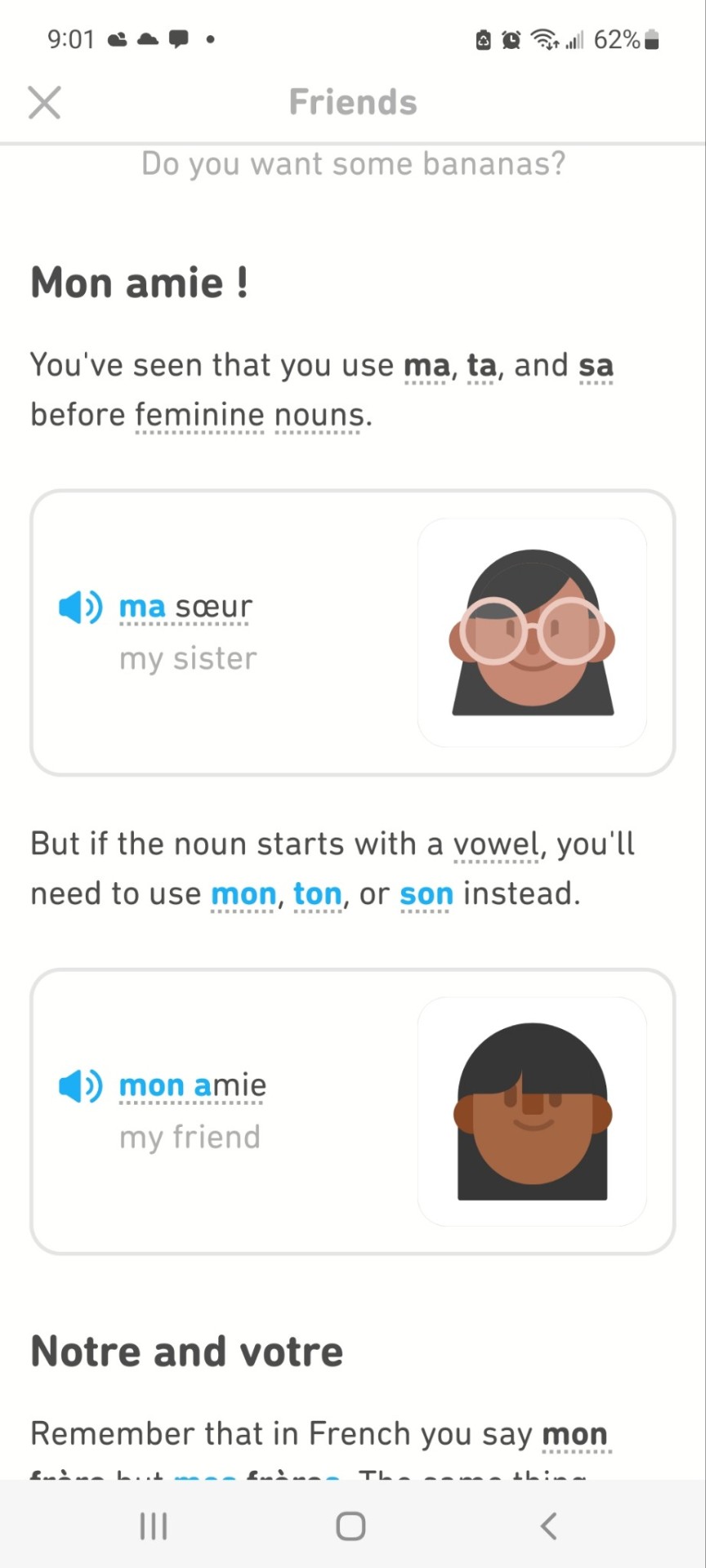#french grammar
Text
Teaching French to English Speakers:
French lesson: The word "sur" means "on"
English speaker: Okay.
French lesson: For example,
The vase is [on] the table.
The house is [on] the right.
I read this book [on] his recommendation.
Bring me the file [on] copyright licensing.
English speaker: Right. Got it. "Sur" means "on."
.
Teaching French to Chinese speakers:
French lesson: The word "sur" means "on."
Chinese speaker: Okay.
French lesson: For example,
The vase is [on] the table
Chinese speaker: Right. Got it. "Sur" means "on."
French lesson: The word "sur" also means "towards."
Chinese speaker: Eh?
French lesson: For example,
The house is [towards] the right.
Chinese speaker: Oh...kay.
French lesson: The word "sur" also means "because of."
Chinese speaker: What? H..how? What?
French lesson: For example,
I read this book [because of] his recommendation.
Chinese speaker: Why does this one word mean all these things? Don't y'all have any other words?
French lesson: The word "sur" also means "containing information pertaining to."
Chinese speaker: Stop fucking around with me.
French lesson: For example,
Bring me the file [containing information pertaining to] copyright licensing.
Chinese speaker: What the fuck is wrong with this language?
#linguistics#english#french langblr#chinese langblr#french grammar#since ppl who don't follow me are reblogging this I feel I should clarify that I made this post#because I've been taking 2 French courses on Duolingo - the one for English speakers AND the one for Chinese speakers#I finished the Duolingo Chinese course for English speakers and was frustrated by how little content it offered
18K notes
·
View notes
Text
Making Nouns Plural in French
Most nouns in French are made plural by simply adding a silent -s to the singular form:
la famille -> les familles
un élèves -> les élèves
Nouns ending in -s, -x, or -z remain unchanged in its plural form:
le corps -> les corps
le prix -> les prix
le nez -> les nez
Nouns ending in -eau add -x to the plural form:
le bateau -> les bateaux
l'oiseau -> les oiseaux
Nouns ending in -eu add -x to the plural form:
le jeu -> les jeux
le lieu -> les lieux
Exception: le pneu -> les pneus
Nouns ending in -al change to -aux in the plural:
l'animal -> les animaux
le journal -> les journaux
Exceptions: le bal -> les bals, le festival -> les festivals
Nouns ending in -ou add -x to the plural:
le bijou -> les bijoux
le genou -> les genoux
Some nouns are always plural (such as les ciseaux, les gens, les lunettes).
Some nouns are singular but refer to a group of people (le public, tout le monde, le groupe). Singular verbs need to be used for agreement.
In French, last names do not add an -s in the plural unlike in English
Les Renard (The Renards)
Les Lescaut (The Lescauts)
Some useful irregular plurals:
l'oeil -> les yeux
le travail -> les travaux
madame -> mesdames
monsieur -> messieurs
Please let me know if there are any mistakes. Information gathered from here.
74 notes
·
View notes
Text
✎ order of adjectives & nouns * ˚ ✦
✦ most often, the noun will come before the verb in french
elle a les yeux verts
les yeux (noun) + verts (adjective)
✦ however, in a few situations the adjective comes before the noun
✦ beauty
il y a un joli parc près de chez toi
✦ age
il est un vieil homme
✦ order
la deuxième rue
✦ size
j’ai un petit appartement
✦ goodness
c’est un bon croissant
#french#french language#frenchblr#french langblr#french learning#langblr#language learning#french vocab#study french#foreign languages#self study#francais#français#learning french#france#french grammar
59 notes
·
View notes
Text
A little compilation of French Verb Clauses / Tenses With a little mood in the background
French Moods and Tenses
Central Idea: French language has various moods and tenses that are used to express different actions and attitudes.
Key Tenses / Clause Forms 📄:
Présent: Present tense, Indicative mood, endings change based upon verb types, Ex. I was → Je lave
Imparfait: Past tense, Indicative mood, endings stay the same for all, Ex. I was washing →Je lavais
Passé Composé: Past tense, Indicative mood, endings change based upon verb types, Ex. I have washed →J’ai lavé, helpful link: https://acupoffrench.com/french-grammar/passe-compose/Avoir
Conjugations of Avoir:
J'ai
Tu as
Il/Elle/On a
Nous avons
Vous avez
Ils/Elles ont
Futur Simple: Future tense, indicative mood, endings are the same, Ex. I will wash →Je laverai
Futur Proche: Future tense, similar to I WILL do, Aller + Infinitive Ex. I will wash →Je vais laver
Aller Conjugations:
Je vais
Tu vas
Il/elle/on va
Nous allons
Vous allez
Ils/elles vont
Si Clauses: Clauses with parameters, helpful link: https://www.lawlessfrench.com/grammar/si-clauses-first-conditional/
Types of First Condition Si Clauses:
Si + present or passé composé, (then) present, Ex. If you’ve done your homework, you can go out tonight. →Si tu as fait tes devoirs, tu peux sortir ce soir
Si + present or passé composé, (then) future, Ex. If you’ve done your homework, you’ll be able to go out tonight. →Si tu as fait tes devoirs, tu pourras sortir ce soir.
Si + present or passé composé, (then) imperative, Ex. If you’ve done your homework, go out. →Si tu as fait tes devoirs, sors
Le Conditionnel Présent: ‘Would’ Clause, I would like →Je voudrais , It’s different from l’imparfait in that the stems are different (remember first ‘r’ rule, not technically a tense, but it's really useful, so I thought I would put it here)
General Links:
Conjugation dictionary w/ context: https://conjugator.reverso.net/conjugation-french.html
Good explanation of indicative tenses: https://francais.lingolia.com/en/grammar/tenses
Good video with a visual timeline to help determine how a tense is used: https://youtu.be/SApp5pEtCB4?si=yGdiKMRXjMz5hpGV
^ Similar to the video above, but with a little more focus on verb endings: https://youtu.be/lbj5Wx8GP7o?si=XGS5qDCIogWoSKcv
A more concise site for a general overview: https://blog.lingoda.com/en/french-tenses/
I just really like this site, it's got a lot of avenues to look into, kind of a one-stop-shop: https://www.lawlessfrench.com/grammar/verb-timeline/
Mood Chart 🎭:
From Busuu: https://www.busuu.com/en/french/tenses
^ This link has some great explanations of moods and a really great chart (the chart is THE BEST)
Verb Moods in French 📑:
Central Idea: Verb Moods
Verb moods indicate the attitude or intention of the speaker.
Main Branches:
Indicative Mood
Subjunctive Mood
Conditional Mood
Imperative Mood
Infinitive Mood
Sub-branches:
1. Indicative Mood ⭐:
Used to state facts or express certainty.
Examples:
Present Indicative
Past Indicative
Future Indicative
2. Subjunctive Mood ⭐:
Used to express doubt, uncertainty, or subjective opinions.
Examples:
Present Subjunctive
Past Subjunctive
Imperfect Subjunctive
3. Conditional Mood:
Used to express hypothetical or uncertain situations.
Examples:
Present Conditional
Past Conditional
4. Imperative Mood:
Used to give commands or make requests.
Examples:
Affirmative Imperative
Negative Imperative
5. Infinitive Mood:
Used to express actions in their most basic form.
Examples:
Present Infinitive
Past Infinitive
Note: Each mood has its own conjugation rules and usage in different contexts.
#french language#french#grammar#french grammar#language#language study#language learning#verb tenses#verbs#writing#langblr#linguistics
8 notes
·
View notes
Text
VERBS I LEARNED THIS WEEK :
Commander : to order something or to order somebody around ,give the orders :
J'ai commandé une robe par catalogue
I ordered a dress from a catalogue
Elle a commandé une pizza
She ordered a pizza
Le professor a commandé à l'élève de se taire
The teacher ordered the student to be quiet
Lever : to raise ,hold something up ,put something in the air ,to get up
Elle a levé la main
She raised her hand
Elle a levé la main pour répondre à la question
She raised her hand to answer the question
Je me lève à sept heurs pour aller travailler
I get up at seven to go to work
Avoir besoin de : to need( have need of )
J'ai besoin d'une plus grande taille
I need a bigger size
Elle a besoin d'une nouvelle veste
She needs a new jacket
Elle a besoin de sucre
She needs sugar
Prendre : to take, to pick up ,to take something from someone, to take the train, bus ,to have a meal etc (prendre is a really useful verb )
Je prends mon petit déjeuner à huit heures tout les jour
I have my breakfast at eight am everyday
Il m'a pris mon stylo
He took my pen
J'ai pris le livre chez moi
I took the book to my place
Elle doit prendre le train à neuf heures
She has to take the bus at 9am
J'ai pris un taxi hier
I took a taxi yesterday
Il a pris le verre qui était sur la table
He picked up(took) the glass that was on the table .
#langblr#language#studying#french#studyspo#language learning#learnigfrench#french vocab#french langblr#studying french#language blog#french language#polyglossary#polyglot#frenchverbs#studyblr#30 days of productivity#studyblr community#french grammar#learning french
38 notes
·
View notes
Text
Key verbs used in French when talking on the phone.
Make sure you sure you take the quiz to check your knowledge.
🌸Excellente journée !🌸
More French 👇www.learnfrenchwithchanty.com
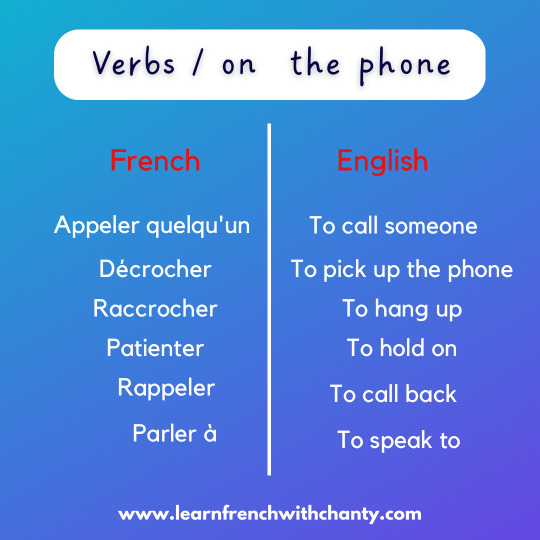

#french langblr#french#learnfrench#frenchblr#studyfrench#learningfrench#languageblr#hablarfrances#frenchword#francais#studyblr#langue française#polyglots#french language#tumblr français#languefrançaise#frenchteacher#learn french#franceska#french grammar#frenchvocabulary#onthephoneinfrench
20 notes
·
View notes
Text
i want to start a study group for french on discord for people who have studyblrs!
let me know if you would be interested
#studyblr#studyspo#langblr#studying#study motivation#language learning#french langblr#French#french grammar
44 notes
·
View notes
Text
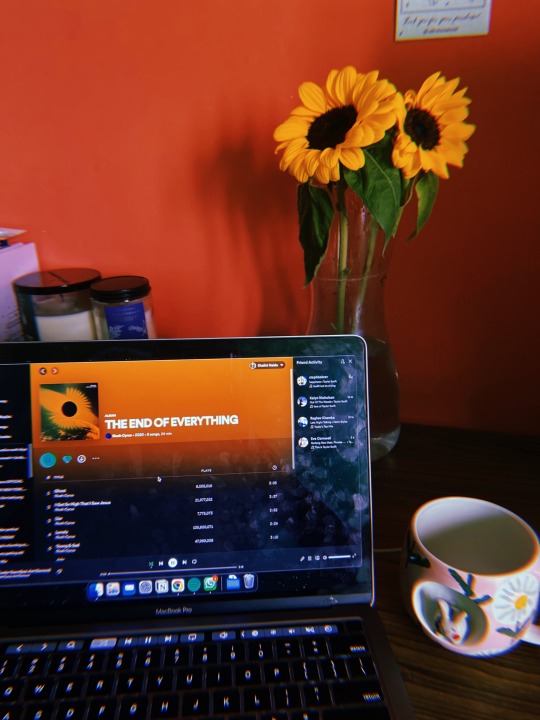
Hello! Hello! Long time no see!
Kickstarting another small burst of energy to be productive. For now, we're just vibing with my fav album and some summer flowers.
29 notes
·
View notes
Text
french class notes — 210823
niveau: intermédiaire
Les pronoms COD et COI
COD [complément d'objet direct]
↷ Les prépositions ne sont pas utilisées après le verbe.
Example avec le verbe AIMER [direct]. Aimer quelq'un ou quelque chose.
J'aime le chocolat → Je l'aime bien. [COD]
Nous avons utilisé le pronom COD le pour éviter de répéter le mot "chocolat".
COI [complément d'objet indirect]
↷ Il faut utiliser la préposition après le verbe.
Example avec le verbe ENVOYER À [indirect].
J'ai envoyé le cadeau à Olivia. → Je lui ai envoyé le cadeau. [COI]
ou
J'ai envoyé le cadeau à Olivia. → Je le lui ai envoyé. [COD et COI]
L'ordre générale des pronoms
pronom sujet + pronom object direct/indirect + verbe
À l'impératif les pronoms viennent après le verbe:
✶﹒Compléte-les.
✶﹒Regarde-le.
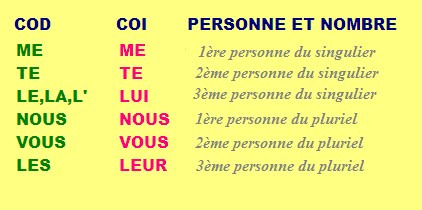
2 notes
·
View notes
Text
Asking for Meaning in Three Different Languages
When we ask what things mean in English, we anthropomorphize them to a certain degree. We ask, "What does this say?" as if the word is capable of speech, capable of communicating its meaning with conscious intent.
We treat inanimate words like we treat people, using the same sentence construction we'd use to ask, "What does she say?"
Like English, French also uses the same sentence construction for both inanimate words and people. But French takes the anthropomorphism a step further.
In French, when you want to know the meaning of something, you ask "Qu'est-ce que ça veut dire?" which literally translates as, "What is it that this wants to say?"
I'm fascinated that the word veut (wants) is included in the question, as if the words you're trying to understand are not only capable of speech, but also capable of desire.
.
In Mandarin you say 这是什么意思. The only verb in the question is 是 (to be) -- "What meaning is this?" In Mandarin, words don't 'have' a meaning or 'communicate' a meaning; words are a meaning.
Unlike French & English, you don't use the same sentence structure when addressing people.
When asking a person, "What do you mean?" Mandarin drops the verb altogether: 你什么意思 (literally, "You; What meaning?")
You can also ask a person, "你说什么" which can either mean "What did you just say?" or "Whaddaya say?" (as in, "What is your opinion?") depending on tone/context.
70 notes
·
View notes
Text
French Relative Pronouns
langblr reactivation challenge | week 2, day 2
Relative pronouns introduce relative clauses. They replace a noun or pronoun from the previous sentence to avoid repetition.
Qui, Que, Qu', Dont
These pronouns can refer to people, animals, concepts, or things.
Qui is used for the subject, it corresponds with "who" in English
> Julien, qui roulait trop vite, a eu un accident
Que is used for the object of the sentence. This cannot be left out in French, but can in English
> Il a eu un accident avec la voiture que son père lui avait prêtée
Dont is used to indicate possession or belonging and is used with words that take the preposition de
> Il a eu un accident avec la voiture dont les freins étaient cassés
Exceptions:
Without a preposition, qui can refer to both people and things. With a preposition, qui can only refer to people not things
If que is used with a preposition, it becomes quoi
Où
The relative où is used with reference to a place or time
> Il a cherché un garage où faire réparer la voiture
Ce qui, Ce que, Ce dont
These are used when the pronoun refers to an entire clause, rather than a single word.
Ce qui is used for a grammatical subject
> Il ne sait pas ce qui s'est passé
Ce que is used for a direct object
> Il ne sait pas ce qu'il a fait
Ce dont is used with verbs, adjectives, and nouns that normally take the preposition de
> Il a raconté tout ce dont il se souvient
Lequel, Laquelle
The relative pronoun lequel is a variable and must agree in gender and number with the word it refers to. It can be translated into English as "the one (which/that)" or "which one." It can also be used with a preposition.
It is used:
With a preposition
> C'est la voiture avec laquelle il a eu un accident
When the word being referred to is a thing, not a person
> C'est une terrible histoire à laquelle il faut faire face
With entre and parmi
> Voici les deux nouveau modèles de voiture entre/parmis lesquels vous avez le choix


Dont and Duquel
Both relative pronouns are used with words that take the preposition de, but in different cases:
Dont is used with verbs, nouns, and adjectives that are formed with de
> Voici le tableau dont je vous ai parlé
Duquel and its variations are used with prepositions or prepositional phrases (ex. à cause de, à la fine de, etc)
> Les chiens à côté desquels je me suis assis n'étaient pas contents
Duquel is also used when the relative pronoun is not the first word in the relative clause
> Il avait un petit appartement sur les murs duquel il y avait des moisissures
Please let me know if there are any mistakes! Information and sentences are taken from here.
83 notes
·
View notes
Text
✎french indicative verb forms
present
présent - i (verb), i am (verb)+ing, i do (verb)
current actions
habitual actions
actions that are about to occur
past
imparfait - was, was (verb)+ing
descriptions - age, weather, feelings, health, time
habitual actions - used to (verb)
actions with unspecified endings
background info
indirect speech
passé antérieur - past perfect literary tense, formal writing
passé composé - i (verb)+ed, i have (verb)+ed, i did (verb)
completed actions
repeated actions
series of actions
passé simple - simple past literary tense, formal writing
plus-que-parfait - differentiates between when two things happened in the past, and which happened first
future
futur - i will (verb)
future actions
polite orders and requests
futur antérieur
something that will be completed in the future
#self study#french#french langblr#french language#french learning#frenchblr#langblr#language learning#french vocab#foreign languages#study french#french grammar#language#francais
34 notes
·
View notes
Text
06/30 days of language learning.
This is a summary of what i did these past few days, let's start with French, I read a short story about the beaches of France ,did my anki cards ,learned how to use lequel,lequelle,lequels ,watched a lot of children's cartoons in French ,found out how to use ce,cet,ces and cette. In English I recorded myself and made a paragraph with piled up vocabulary, read a wikipedia's article aloud .
Things I wanna do next week :
Get started on the imparfait
Write a daily paragraph
Improve my grammar in English
Study the verbs which use "être " as an auxiliary verb.
#langblr#studying#studyblr#french#language learning#language#learnigfrench#30 days of productivity#studyblr community#studyspo#french langblr#language blog#french grammar
8 notes
·
View notes
Text
The French imperative mood -part1
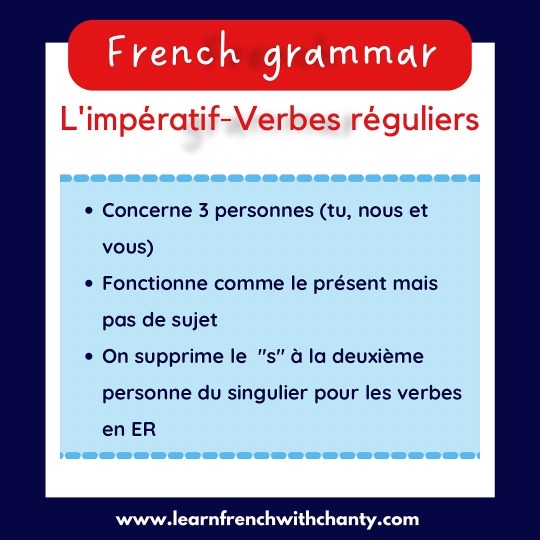
#french langblr#french#learnfrench#frenchblr#studyfrench#learningfrench#languageblr#hablarfrances#frenchword#studyblr#langue française#francais#languefrançaise#tumblr français#polyglots#french language#frenchteacher#franceska#french grammar#learn french#imperative
24 notes
·
View notes
Text

Des questions ? Do you have questions ? 💭
Lauve.french
#lauvefrench#mistakes#french#language#frenchlearners#french learning#learning tips#francais#common mistakes#how are you?#questions#phrases#grammar#french grammar#vocabulary#grammaire
5 notes
·
View notes
